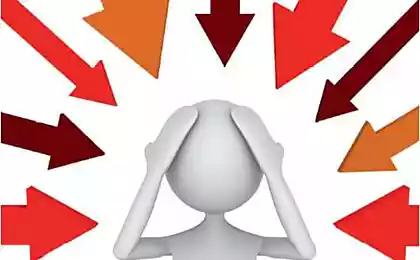421
Ruminate: How to throw a mental gum
Ruminate is a recurring thoughts about the situation that provoked strong negative emotions.
The person repeatedly loses in mind unpleasant events or conversation, trying to find something he could say or do differently, better.
It would seem that what is wrong is that the person tries to draw useful conclusions from the situation in the future? The problem is that ruminate not lead to a productive solution, they just absorb his time and intellectual resources in the barren regrets of the past.

Ruminate differ from worry about the future. Anxiety about the future is the thinking component of anxiety. It usually starts with "what if" and runs a chain of assumptions, of which man tries to find a way to reduce anxious feelings about possible events. This anxiety in certain, shall we say, normal, the scale has a good man a service, as it motivates him to better prepare for the upcoming event, to calculate the likely difficulties.
Ruminate, in contrast to the anxiety about the future, is entirely devoted to events that have already happened, in which nothing can change. People with questions, full of criticism, why does he not have behaved otherwise, why is he not better prepared, why is he such a loser. Such experiences delay and eventually turn into a habit that is repeated in a state of sadness or anxiety, or occur in certain situations or places, for example, every night before bed, or before meeting new people.
Ruminate negatively affect the emotional state of a person as they return it in a negative feelings about an unpleasant event. Ruminative thinking is often associated with pessimism, the experience of hopelessness, excessive criticism and an increased need for the support and help of other people. Ruminate also complicate the search of social support and communication with loved ones who are tired of fruitless discussions of the same problem over and over again.
In recent decades, many studies demonstrate the linkage between ruminatsii and such diseases as depression, anxiety, eating disorder and various forms of dependencies. In 2012, a study was conducted whereby ruminate are associated with higher levels of the hormone cortisol. Elevated levels of cortisol, which in turn correlates with a higher risk of developing diabetes and cardiovascular diseases.
Why do people continue to dominirovali on the topic painful situation for him if this makes no sense? The answer is simple. Ruminate give man the illusion that he was looking for a solution to a problem situation. Man looking for, what is it "wrong". And, you know, all of us have something "wrong". But the fixation on finding all his faults and shortcomings does not give the opportunity to improve, but only leads to low self-esteem and increased negative thinking, and sometimes depression.
Causes ruminative thinking, according to the S. Zero-Hoeksema, rooted in the so-called learned helplessness, and stressful life events.
Learned helplessness — a condition of man, wherein he is not trying to improve or change the situation, even if this means. Learned helplessness is formed as a result of prolonged feelings of person that the surrounding situation does not depend on his actions. Over-protective parents, giving your child the opportunity to gain experience, can create his habit passively react to circumstances, and a tendency to obsessive ruminative thinking as a means of coping with their learned helplessness. Such stressful events as divorce, moving, loss and the search for a new job, perceived as something uncontrollable, and often run ruminative thinking.

There are simple tips and tricks that allow you to cope or at least to reduce the intensity ruminative thinking.
First, the person prone to rumination, it is necessary to divide that in your life, subservient to his control and what is not. People can change their behavior, but does not control the reactions of other people. So the excitement in that controllable, doesn't do any good.
Then you should analyze your weaknesses and start looking for productive solutions.
If you are unable to break the cycle of negative thinking, people should try to distract yourself. Better suited for this exercising, walks in the Park and meditation. The person prone to rumination, it is useful to know, when he often indulges in negative thinking, to be able to escape for physical exercise, a walk or meditation.
I want to stress again that ruminative thinking is a habit, which takes time and hard work.
If the above tips do not give the desired effect, the most reasonable will be to seek the assistance of a cognitive-behavioral therapist. So how exactly does cognitive-behavioral psychotherapy, but rather the practice of conscious care, is the most effective method of dealing with ruminative thinking. Conscious care teach a man to arbitrarily shift the attention from obsessive thoughts and unproductive the past, freeing mental resources to find real solutions to problematic situations.published
© Irina Ushkova, a clinical psychologist
Also interesting: Personal psychological boundary: the point where violence starts
Stop trying to dramatize his life!
P. S. And remember, only by changing their consumption — together we change the world! ©
Join us in Facebook , Vkontakte, Odnoklassniki
Source: irinaushkova.ru/ruminacii-ili-myslennaya-zhvachka/
The person repeatedly loses in mind unpleasant events or conversation, trying to find something he could say or do differently, better.
It would seem that what is wrong is that the person tries to draw useful conclusions from the situation in the future? The problem is that ruminate not lead to a productive solution, they just absorb his time and intellectual resources in the barren regrets of the past.

Ruminate differ from worry about the future. Anxiety about the future is the thinking component of anxiety. It usually starts with "what if" and runs a chain of assumptions, of which man tries to find a way to reduce anxious feelings about possible events. This anxiety in certain, shall we say, normal, the scale has a good man a service, as it motivates him to better prepare for the upcoming event, to calculate the likely difficulties.
Ruminate, in contrast to the anxiety about the future, is entirely devoted to events that have already happened, in which nothing can change. People with questions, full of criticism, why does he not have behaved otherwise, why is he not better prepared, why is he such a loser. Such experiences delay and eventually turn into a habit that is repeated in a state of sadness or anxiety, or occur in certain situations or places, for example, every night before bed, or before meeting new people.
Ruminate negatively affect the emotional state of a person as they return it in a negative feelings about an unpleasant event. Ruminative thinking is often associated with pessimism, the experience of hopelessness, excessive criticism and an increased need for the support and help of other people. Ruminate also complicate the search of social support and communication with loved ones who are tired of fruitless discussions of the same problem over and over again.
In recent decades, many studies demonstrate the linkage between ruminatsii and such diseases as depression, anxiety, eating disorder and various forms of dependencies. In 2012, a study was conducted whereby ruminate are associated with higher levels of the hormone cortisol. Elevated levels of cortisol, which in turn correlates with a higher risk of developing diabetes and cardiovascular diseases.
Why do people continue to dominirovali on the topic painful situation for him if this makes no sense? The answer is simple. Ruminate give man the illusion that he was looking for a solution to a problem situation. Man looking for, what is it "wrong". And, you know, all of us have something "wrong". But the fixation on finding all his faults and shortcomings does not give the opportunity to improve, but only leads to low self-esteem and increased negative thinking, and sometimes depression.
Causes ruminative thinking, according to the S. Zero-Hoeksema, rooted in the so-called learned helplessness, and stressful life events.
Learned helplessness — a condition of man, wherein he is not trying to improve or change the situation, even if this means. Learned helplessness is formed as a result of prolonged feelings of person that the surrounding situation does not depend on his actions. Over-protective parents, giving your child the opportunity to gain experience, can create his habit passively react to circumstances, and a tendency to obsessive ruminative thinking as a means of coping with their learned helplessness. Such stressful events as divorce, moving, loss and the search for a new job, perceived as something uncontrollable, and often run ruminative thinking.

There are simple tips and tricks that allow you to cope or at least to reduce the intensity ruminative thinking.
First, the person prone to rumination, it is necessary to divide that in your life, subservient to his control and what is not. People can change their behavior, but does not control the reactions of other people. So the excitement in that controllable, doesn't do any good.
Then you should analyze your weaknesses and start looking for productive solutions.
If you are unable to break the cycle of negative thinking, people should try to distract yourself. Better suited for this exercising, walks in the Park and meditation. The person prone to rumination, it is useful to know, when he often indulges in negative thinking, to be able to escape for physical exercise, a walk or meditation.
I want to stress again that ruminative thinking is a habit, which takes time and hard work.
If the above tips do not give the desired effect, the most reasonable will be to seek the assistance of a cognitive-behavioral therapist. So how exactly does cognitive-behavioral psychotherapy, but rather the practice of conscious care, is the most effective method of dealing with ruminative thinking. Conscious care teach a man to arbitrarily shift the attention from obsessive thoughts and unproductive the past, freeing mental resources to find real solutions to problematic situations.published
© Irina Ushkova, a clinical psychologist
Also interesting: Personal psychological boundary: the point where violence starts
Stop trying to dramatize his life!
P. S. And remember, only by changing their consumption — together we change the world! ©
Join us in Facebook , Vkontakte, Odnoklassniki
Source: irinaushkova.ru/ruminacii-ili-myslennaya-zhvachka/
Don't wait for a scary medical diagnosis – thank your body right now!
Charlie Chaplin: the Anguish and emotional suffering are only warning signs























